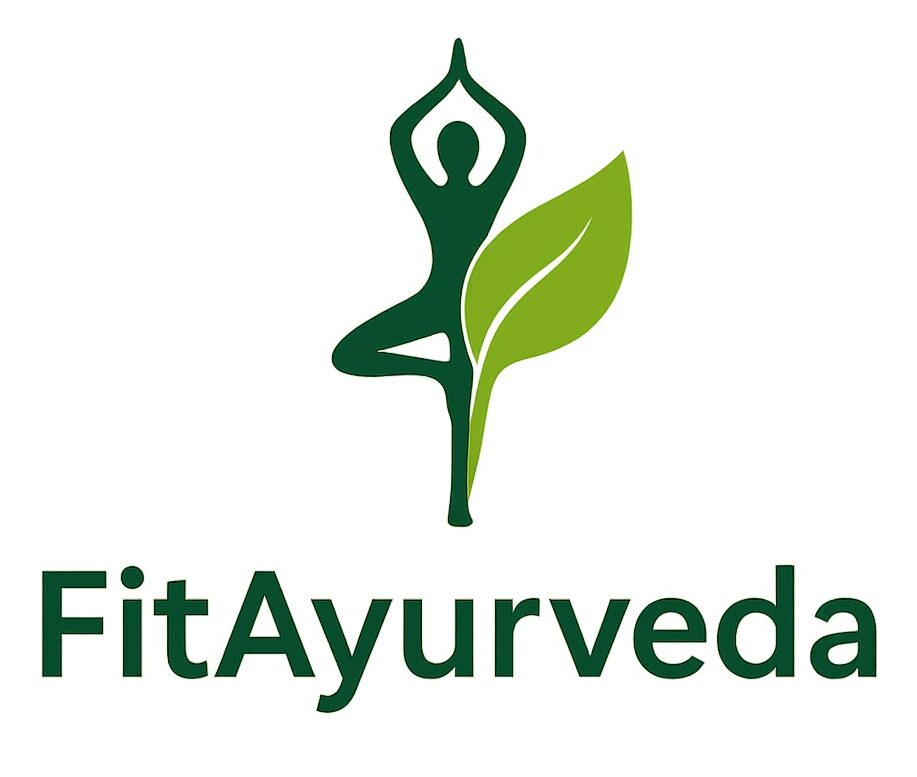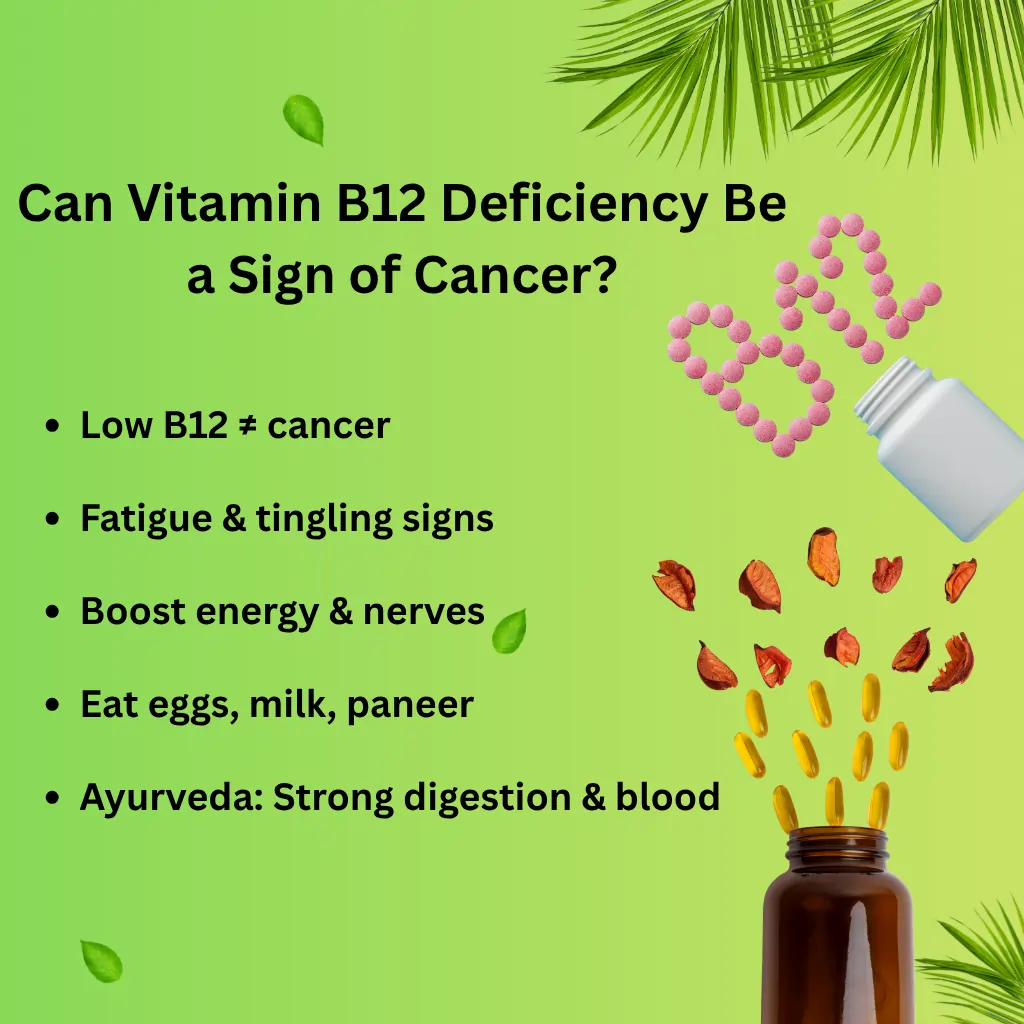Can Vitamin B12 Deficiency Be a Sign of Cancer? – An Ayurvedic and Medical Perspective
It’s a question that often sparks concern — especially if you’ve been feeling unusually tired, weak, or have noticed changes in your skin tone or weight. Vitamin B12, also known as cobalamin, is a vital nutrient that supports red blood cell production, nerve health, and DNA synthesis. When your body lacks enough of it, the effects can be widespread — impacting your energy, focus, mood, and even the way your body repairs cells.
However, here’s the key point: Vitamin B12 deficiency alone doesn’t cause cancer, nor is it a direct sign that you have one. What makes people (and doctors) take it seriously is that some cancers can interfere with B12 absorption or utilization — particularly those affecting the stomach, intestines, or bone marrow.
For example, gastric cancer, pancreatic cancer, and certain blood cancers like leukemia may lead to low B12 levels because they disrupt how your body processes nutrients or forms healthy blood cells. Similarly, pernicious anemia, an autoimmune condition that prevents proper B12 absorption, has been associated with a slightly increased risk of stomach cancer.
That said, most cases of B12 deficiency are not linked to cancer — they’re usually due to dietary gaps (especially in vegetarians or vegans), poor digestion, long-term medication use (like antacids or metformin), or aging.
The Ayurvedic Perspective
In Ayurveda, nutrient deficiencies like low B12 are viewed through the lens of Agni (digestive fire) and Rakta Dhatu (blood tissue). A weak Agni leads to poor digestion and malabsorption — meaning even if you eat nutrient-rich foods, your body may not absorb them properly. Over time, this imbalance weakens Rakta Dhatu, resulting in fatigue, pale skin, low immunity, and poor vitality — symptoms that can mirror anemia or other chronic health issues.
Ayurveda doesn’t separate the body into isolated systems; it sees health as a balance of Doshas (Vata, Pitta, and Kapha) and Dhatus (tissues). When Rakta Dhatu is depleted, it reflects in your skin color, energy levels, and overall strength — much like modern medicine describes in vitamin B12 deficiency.
The Connection Between Deficiency and Disease
It’s important to understand that deficiency can be both a symptom and a trigger. For instance, chronic low B12 levels can weaken your immune system, affect DNA repair, and increase oxidative stress — all factors that may indirectly raise your long-term disease risk if ignored.
But the good news is, by identifying and correcting the root cause — whether through dietary changes, supplements, or Ayurvedic therapies — you can restore balance and prevent further complications.
So, while a vitamin B12 deficiency isn’t a direct sign of cancer, it’s your body’s way of signaling that something deeper might need attention — especially your digestion, absorption, and blood health.
Let’s now look at what both modern science and Ayurveda recommend to naturally support healthy B12 levels and protect your overall vitality.
Also Read: Vitamin B12 Deficiency and Skin Discoloration
Understanding Vitamin B12: Why It’s So Important
Vitamin B12, also known as Cobalamin, is one of the most vital nutrients your body needs every single day — yet it’s often overlooked. Unlike other vitamins, B12 plays a role in multiple essential functions that keep your body strong, your mind sharp, and your cells healthy.
This water-soluble vitamin is responsible for:
-
Producing red blood cells: B12 helps form healthy red blood cells that carry oxygen throughout your body. Without enough of it, your blood can’t transport oxygen efficiently — leading to fatigue, dizziness, and weakness.
-
Maintaining nerve health: It supports the protective sheath (myelin) around your nerves, ensuring smooth communication between your brain and body. A deficiency can cause tingling sensations, numbness, or even nerve damage over time.
-
Supporting brain and mental function: B12 contributes to the production of neurotransmitters that regulate mood, memory, and focus. Low levels are linked to irritability, depression, and cognitive decline.
-
Synthesizing DNA: Every cell in your body depends on B12 for proper DNA formation — the blueprint of life that directs cell growth and repair.
When your B12 levels drop, it doesn’t just affect one system — it disrupts how your entire body functions. Deficiency can cause megaloblastic anemia (a condition where red blood cells become abnormally large and underdeveloped), chronic fatigue, pale or yellowish skin, shortness of breath, and neurological symptoms such as tingling hands and feet.
These symptoms can be confusing because they overlap with early warning signs of other conditions, including digestive disorders, autoimmune diseases, or even cancers of the stomach, pancreas, or blood. That’s why understanding and maintaining adequate vitamin B12 levels is crucial — not only for your daily energy and immunity but also for early disease prevention.
In Ayurveda, B12’s role aligns with the nourishment of Rakta Dhatu (the blood tissue) and Majja Dhatu (the nerve tissue). A deficiency is considered a sign of weakened Agni (digestive fire), leading to poor absorption and diminished vitality. When your Agni is strong, your body naturally extracts and utilizes nutrients efficiently — maintaining balance, strength, and mental clarity.
Up next, let’s look deeper into whether a Vitamin B12 deficiency can signal something more serious, such as cancer, and how both modern science and Ayurveda interpret this connection.
Can Vitamin B12 Deficiency Be Linked to Cancer?
While a Vitamin B12 deficiency isn’t a direct cause of cancer, research suggests that there can be a connection in certain medical situations — mainly when the deficiency results from diseases that interfere with nutrient absorption, blood formation, or liver function.
Let’s explore how this link may occur:
1. Stomach and Intestinal Cancers
Cancers affecting the stomach or small intestine can interfere with the body’s ability to produce intrinsic factor — a protein made by the stomach lining that is essential for Vitamin B12 absorption.
Without intrinsic factor, even if your diet is rich in B12 (from foods like dairy, eggs, or fish), your body can’t absorb it properly.
This condition, known as pernicious anemia, has been observed more frequently in people with chronic gastritis or stomach cancer. Hence, when stomach tissues are damaged by inflammation or malignancy, B12 levels tend to drop.
2. Blood-Related Cancers (Leukemia, Lymphoma, Myeloma)
Vitamin B12 plays a crucial role in producing red and white blood cells in the bone marrow.
In cancers such as leukemia or lymphoma, the bone marrow’s normal function is disrupted, which can alter B12 metabolism.
This may lead to abnormal blood cell counts, anemia, or elevated B12 levels in some cases — depending on how the disease affects the bone marrow and liver.
3. Liver Cancer or Liver Damage
Your liver stores most of your body’s Vitamin B12. When liver function is compromised — whether from hepatitis, cirrhosis, or liver cancer — these reserves are depleted.
As a result, even if you consume enough B12 through your diet, the liver may not release it efficiently into the bloodstream, causing symptoms of deficiency such as fatigue, weakness, and poor concentration.
The Key Takeaway
It’s important to understand that low Vitamin B12 levels are usually a result of an underlying issue — not necessarily a sign of cancer itself.
In many cases, the cause may be nutritional deficiency, poor digestion, long-term medication use (like proton pump inhibitors or metformin), or age-related malabsorption.
Still, unexplained B12 deficiency — especially when accompanied by significant weight loss, digestive discomfort, or chronic fatigue — should always be medically evaluated to rule out serious causes, including malignancy or autoimmune disorders.
Other Common Causes of Vitamin B12 Deficiency
Before jumping to conclusions, consider these far more common reasons for low B12:
-
Poor dietary intake (especially in vegetarians or vegans)
-
Weak digestive fire (Mandagni) leading to poor absorption
-
Low stomach acid (common in older adults)
-
Autoimmune conditions like pernicious anemia
-
Long-term use of antacids or metformin
-
Alcoholism or liver disorders
Ayurvedic View: The Role of Agni and Rakta Dhatu
According to Ayurveda, nutrient absorption and blood formation depend on:
-
Agni (Digestive Fire): Weak Agni hampers proper breakdown of food, preventing nutrient absorption — including B12.
-
Rakta Dhatu (Blood Tissue): This tissue nourishes skin, muscles, and organs. If it becomes weak or impure, symptoms like pale skin, fatigue, and low immunity arise.
Ayurveda doesn’t describe “Vitamin B12” directly but relates its deficiency to Rakta Kshaya (depletion of blood) and Pitta imbalance, leading to:
-
Pale or dark skin patches
-
Dull complexion
-
Tiredness and poor focus
-
Burning sensations or tingling
How Ayurveda Helps Restore Balance Naturally
1. Strengthen Digestive Fire (Agni)
Start with simple daily habits:
-
Sip warm water infused with ginger or cumin seeds.
-
Eat freshly cooked meals.
-
Avoid overeating and cold, processed foods.
2. Include B12-Supportive Ayurvedic Foods
While plant sources don’t naturally contain B12, Ayurveda focuses on improving absorption through balanced digestion.
Recommended foods include:
-
Fermented foods like idli, dosa, and curd
-
A2 cow’s milk and ghee
-
Mung dal, sesame seeds, and beetroot
-
Leafy greens with lemon juice (for better iron and B12 synergy)
3. Herbal Support for Blood and Energy
Ayurvedic herbs that nourish Rakta Dhatu and improve absorption:
-
Ashwagandha: Builds strength and immunity.
-
Shatavari: Enhances digestion and nourishment.
-
Punarnava: Supports liver function and detoxification.
-
Amla (Indian Gooseberry): Rich in Vitamin C, boosts absorption of nutrients.
4. Panchakarma Detox Therapies
Panchakarma helps eliminate toxins that block nutrient channels (Srotas), improving overall absorption and vitality. Therapies like Virechana (purification) and Raktamokshana (bloodletting) may be advised under expert supervision.
When to See a Doctor
Consult a healthcare professional if you experience:
-
Persistent fatigue or dizziness
-
Yellow or pale skin
-
Tingling or numbness in hands or feet
-
Unexplained weight loss
-
Digestive issues or poor appetite
A simple blood test can measure Vitamin B12 levels and rule out other serious conditions. Ayurveda can complement modern treatment but should never replace necessary medical diagnosis or therapy.
Takeaway: Don’t Panic, Understand and Act
Vitamin B12 deficiency may share symptoms with cancer, but it doesn’t mean you have one. In most cases, the root lies in poor nutrition, weak digestion, or stress — all reversible with timely care.
Ayurveda focuses on strengthening your body’s natural ability to absorb and utilize nutrients, restoring vitality from within. By balancing Agni and nourishing Rakta Dhatu, you can regain energy, immunity, and glowing health naturally.
Disclaimer
This article is for educational purposes only and not a substitute for professional medical advice. Always consult a qualified healthcare provider or Ayurvedic practitioner before beginning any new treatment or herbal remedy.
For More Information
Harvard Health – Vitamin B12 and Your Health
FAQ: Vitamin B12 Deficiency and Cancer
1. Can B12 deficiency indicate cancer?
Not usually. Most deficiencies are due to diet, poor digestion, or medications, though some cancers (stomach, liver, blood) can affect B12 levels.
2. Which cancers are linked to B12 issues?
Stomach, pancreatic, liver, and certain blood cancers may interfere with absorption or storage of B12.
3. How do I know if my deficiency is serious?
Persistent fatigue, pale skin, tingling, or unexplained weight loss warrants a blood test and medical consultation.
4. Can Ayurveda help?
Yes. Strengthening Agni and Rakta Dhatu with herbs, a balanced diet, and lifestyle practices supports natural B12 absorption.
5. Which foods boost B12?
Milk, curd, paneer, eggs, fish, and fortified cereals. Vegetarian foods work best when combined with digestion-boosting spices like cumin, ginger, or asafoetida.
6. Is B12 deficiency reversible?
Yes — with diet, supplements if needed, and proper digestive support.

